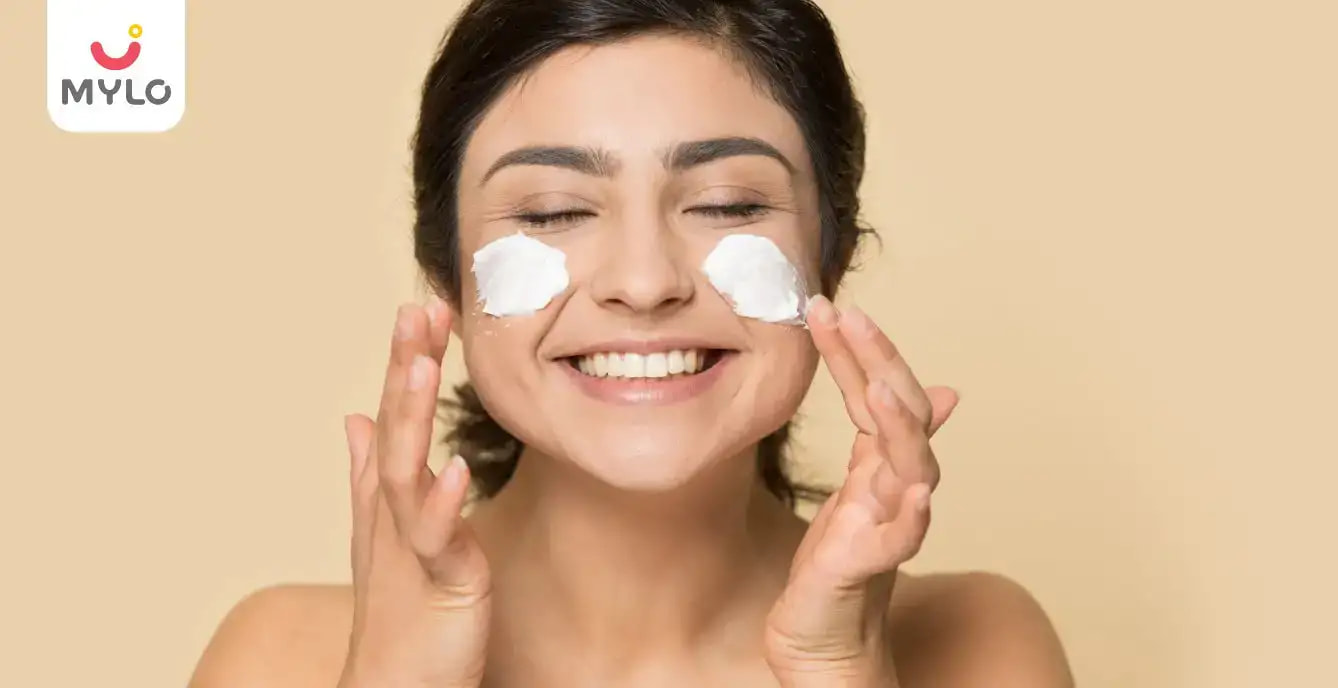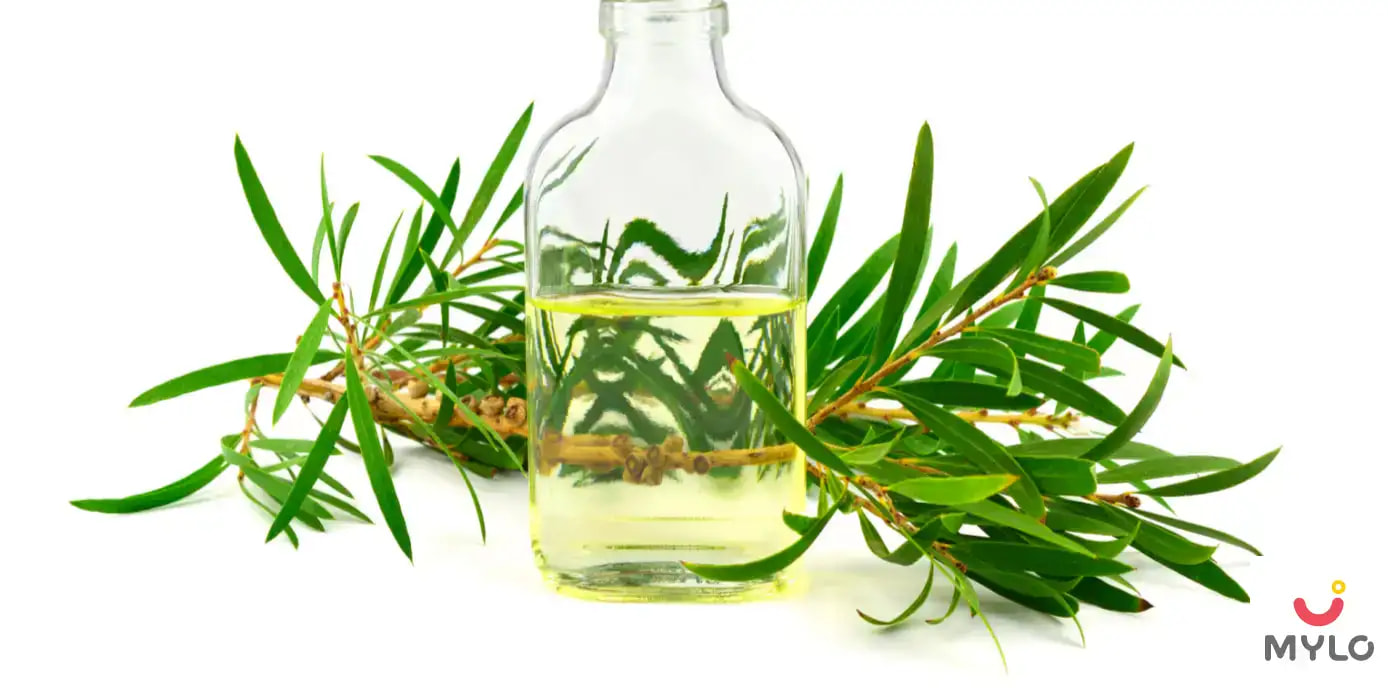Home

Pregnancy

What are the Benefits of Using a Whitening Cream on Your Face?
In this Article

Pregnancy
What are the Benefits of Using a Whitening Cream on Your Face?
Updated on 3 November 2023
Nowadays, all women want clear, even, radiant skin regardless of age or ethnicity. It has become an obsession for many women. For many women, complexion and appreciating factors matter greatly since they indicate beauty. Many of us think for a while about observing the overall body profile when seeing ourselves in the mirror. Skin whitening enhances self-esteem and confidence in an individual. However, it is not the be all and end all of defining the beauty of an individual. So, never let a cream overpower your personality.
What Is A Whitening Cream?
Whitening creams are also known as skin lightening creams designed to lighten or brighten skin color and achieve a lighter overall complexion. These creams are often used in the spot treatment of dark areas of skin, such as age spots, acne scars, and discoloration related to hormones. They are used to brighten the overall complexion.
These products include bleaching creams, soaps, lotions, oils, serums, pills, and professional treatments like chemical peels and laser treatments. It is also used to treat the appearance of blemishes such as birthmarks. Consult your dermatologist on which kind of product is best for you.
Skin whitening procedures decrease the concentration or production of melanin in the skin. Melanin is a pigment that gives skin its color and helps to protect it from sun damage. Several chemicals are effective in skin whitening, while some have proven to be harmful or toxic and have safety concerns.
In African countries, 30 - 80% of women regularly use skin whitening products. In Asian countries, 40% use it, while in India, about 50% of the skincare products are sold to brighten skin. Efforts to lighten skin age back to the mid-1500s.
How does it work?
Skin whitening cream includes ingredients that work to decrease your body's concentration of melanin. Melanin is produced by cells called melanocytes. These products work by reducing the number of melanocytes in your skin.
Many whitening products contain a chemical called hydroquinone, which is known to decrease melanocytes. Vitamin C is also a commonly used ingredient in these products. It acts as an antioxidant to lower the melanin count in your skin.
As an exfoliant, glycolic acid, also present in many whitening creams, brightens the skin by clearing away dead cells. A protein derived from vitamin A called retinol is used to lighten dark spots. They function by speeding up the turnover of surface skin cells.
Benefits of using skin whitening cream
Although there is no particular health benefit to skin whitening, it can have a desirable effect on the skin when used to test specific skin conditions.
1. Minimizes dark spots
Skin whitening creams can decrease dark spots on the skin caused by sun damage, aging, and hormonal changes. It can benefit those who want to reduce discoloration, such as age spots, sun spots, melasma, freckles, eczema, and psoriasis.
2. Reduce the appearance of acne scars
Some whitening creams may help diminish acne scars. Though they won't help reduce inflammation and redness caused by a breakout, they may decrease red or dark areas that remain after the acne has healed.
3. Evens skin tone
Skin whitening cream can even out skin complexion by minimizing areas of hyperpigmentation, such as sun damage. It can also help diminish the appearance of freckles.
4. Delay aging
Most skin-whitening creams contain ingredients that may delay aging signs. They may help you look younger and more youthful.
Risks of using skin whitening creams
There are many adverse effects of using these creams. One of them is that they do more harm than good if not used properly, leading to conditions such as,
-
It can cause skin damage since some harsh chemicals are used in whitening creams. It may also cause skin burning or rashes. It may also slim your skin which makes it more prone to infections.
-
When you have an increased amount of melanin, it causes dark marks on areas referred to as hyperpigmentation. This is common for people who have darker skin tones.
-
Some whitening creams may contain a hazardous mercury chemical that can potentially damage some organs.
-
The risk of developing skin cancer over time increases significantly if used regularly.
-
The skin may age prematurely if used for a longer time.
-
Other side impacts include irritation of the skin, discoloration, and scarring.
How to use skin whitening creams?
The uses of these creams vary from product to product. They are generally applied only to dark areas of the skin once or twice a day. It is recommended that you follow the instructions given by the doctor or on the packaging. They usually involve:
-
Apply the product using clean hands or with the help of a cotton pad
-
Avoid contact with the areas surrounding your eyes, nose, and mouth
-
After use, wash your hands thoroughly
-
Avoid touching the treated area against another person's skin for at least a few hours after applying the cream.
-
Apply sunscreen to prevent skin damage from UV radiation.
Ingredients Used in Whitening Creams
Some of the ingredients used in skin whitening creams:
1. Bearberry extract
Bearberry extract is an entirely natural skin whitening ingredient found in the bearberry shrub, which contains a chemical called arbutin which acts as a natural skin brightener. Unlike hydroquinone, it is entirely safe and natural. It benefits brightening skin tone and correcting hyperpigmentation problems such as dark spots, freckles, melasma, and acne scars. It has no side effects whatsoever. It also reduces the effects of sun exposure since it contains sun protection filters that help slow skin aging.
2. Kojic acid
It comes from fermented mushrooms and inhibits the overproduction of melanin in pigmented skin. It is found in numerous skin care products. This ingredient is produced after the rice is malted for the making of sake. Kojic acid whitens your skin by inhibiting melanin production, known to darken the skin.
3. Liquorice root extract
It is a powerful and natural skin whitener to treat hyperpigmentation, such as dark spots, sun damage, and melasma. It is also for excessive oil control, making it suitable for oily skin. It is perfect for sensitive skin since it can reduce puffiness, itching, and redness.
4. Niacinamide
Niacinamide actively reduces pigmentation and age spots to brighten and soothe your skin effectively. It increases ceramide concentration and fatty acid level in the skin, which in turn increases hydration levels in your skin. This ensures smoother and softer skin which is less likely to irritate.
5. Citrus extracts
It is a rich source of vitamin C that eradicates your body's free radicals. Cells that cause aging are called free radicals. These extracts give your skin a radiant glow while rejuvenating it. Lemon juice naturally brightens skin and removes dark spots. Due to its acidic content, it can be used to exfoliate your skin. It can significantly reduce aging and sun damage.
6. Glycolic acid
It is the most active and influential alpha hydroxy acid ( AHA) in skin care. It is a natural exfoliant and moisturizer. It helps minimize fine lines and wrinkles. It promotes other ingredients in skin brighteners by allowing them to penetrate farther into the skin.
7. Lactic acid
Lactic acid acts the same as glycolic acid but is typically better suited for people with sensitive skin. It helps other ingredients in skin whitening cream by allowing them to penetrate farther into the skin.
8. Lemon
Lemon is packed with vitamin C and citric acid, which brightens your skin and gives it a healthy glow. Apply moisturizer to your skin after lemon treatment to avoid dryness.
9. Mulberry
Mulberry extracts help the skin as they are a natural choice that delivers results with consistent use. It is used widely by people around the world for purposes of skin whitening. It slows down the aging process and has rich antioxidant properties which prevent fine lines and wrinkles. It helps to achieve flawless and smooth skin.
10. Aloe vera
This plant is so gentle and soothing on the skin that it is called a wonder plant. It is effective in reducing redness and skin discoloration. Rubbing the gel inside the plant will make your skin feel refreshed and brighter.
11. Azelaic acid
Azelaic acid has the same pH level as your skin. It is commonly used to treat irritation and redness. It is also an effective ingredient used in skin lightening. Azelaic acid not only helps even your skin tone, but it also helps to keep your skin clear.
Best ingredients for your skin according to skin type
For dry skin, the cream with the following ingredients can be considered:
Babies have soft skin right from birth because they have a higher concentration of hyaluronic acid. This acid's concentration decreases as age progresses, most significantly after the 40s. As it can boost skin moisture content, it is recommended for whitening creams for dry skin types
Ceramides are another ingredient used in skin brightening creams. It is a type of lipid or fat used to hydrate your skin. These fats are found in the skin's outermost layer, which forms a barrier and protects the moisture content in your skin. It is added in brightening creams to refresh the skin's ceramic levels.
For oily and acne-prone skin, the cream with the following ingredients can be considered:
While oily skin is prone to acne, it can also delay the first signs of aging. Salicylic acid is one of the best ingredients for oily skin. It exfoliates and treats the pore from within, which helps to prevent skin breakouts. It helps in reducing whiteheads and blackheads while calming and soothing the skin.
Lactic acid and azelaic acid are also used in brightening creams for oily skin types. Lactic acid exfoliates and hydrates the skin at the same time. Azelaic acid treats acne and reduces breakouts due to oil secretion.
Dimethicone is also used in skin-whitening creams. It is a chemical that imitates oil, leaving the skin healthy yet matte.
For dull and pigmented skin, the cream with the following ingredients can be considered:
A combination of glutathione, vitamin C, kojic acid, and liquorice extract can be used to reduce pigmentation. Kojic acid inhibits the production of melanin in the skin, which reduces pigmentation. Glycolic acid, vitamin C, and kojic acid can help to reduce fine lines, irregular pigmentation, and dark spots.
For daily use, whitening creams with the following ingredients can be considered:
Aloe vera, hyaluronic acid, vitamin C, retinol, and glycolic acid can be considered in brightening creams for daily use. Different ingredients are used in other creams based on skin type. Hyaluronic acid is generally used in day cream, whereas retinol is used in night cream. Hyaluronic acid is used to reverse aging; it is considered an elixir for youth. At the same time, retinol is a skin-restoring, skin-firming, and wrinkle-smoothing ingredient used in night creams. Retinol is an antioxidant that reduces visible signs of aging.
You may like: https://mylofamily.com/article/5-natural-ways-to-get-glowing-skin-at-home-170986?
Precautions while using skin whitening creams
-
Consult a dermatologist before using a skin brightening cream and ask for specific instructions regarding the product's use.
-
Make sure to check the label behind the product for mercury. It is a harmful chemical that should not be used on your skin. It can be listed as colonel, mercuric, mercurous, or mercury.
-
Make sure that an over-the-counter skin whitening cream has no more than 2% of the hydroquinone chemical. If it is not mentioned on the label, don't assume it is safe to use.
Conclusion
It is recommended to consult a dermatologist to help choose skin whitening creams that can help deal with skin problems like hyperpigmentation ageing, fine lines, or wrinkles. But be realistic about how effective these products can be in skin whitening.
Using these whitening creams is a personal choice, which shouldn't be taken lightly. Many of them have no health benefits and may have serious side effects. Also, weigh the benefits and risks before considering a skin whitening cream.



Written by
Priyanka Verma
Priyanka is an experienced editor & content writer with great attention to detail. Mother to an 11-year-old, she's a ski
Read MoreGet baby's diet chart, and growth tips

Related Articles
Related Topics
RECENTLY PUBLISHED ARTICLES
our most recent articles

Diet & Nutrition
গর্ভাবস্থায় আলুবোখরা: উপকারিতা ও ঝুঁকি | Prunes During Pregnancy: Benefits & Risks in Bengali

Diet & Nutrition
গর্ভাবস্থায় হিং | ঝুঁকি, সুবিধা এবং অন্যান্য চিকিৎসা | Hing During Pregnancy | Risks, Benefits & Other Treatments in Bengali

Women Specific Issues
স্তনের উপর সাদা দাগ: লক্ষণ, কারণ এবং চিকিৎসা | White Spots on Nipple: Causes, Symptoms, and Treatments in Bengali

Diet & Nutrition
গর্ভাবস্থায় পোহা: উপকারিতা, ধরণ এবং রেসিপি | Poha During Pregnancy: Benefits, Types & Recipes in Bengali

Diet & Nutrition
গর্ভাবস্থায় মাছ: উপকারিতা এবং ঝুঁকি | Fish In Pregnancy: Benefits and Risks in Bengali

Diet & Nutrition
গর্ভাবস্থায় রেড ওয়াইন: পার্শ্ব প্রতিক্রিয়া এবং নির্দেশিকা | Red Wine During Pregnancy: Side Effects & Guidelines in Bengali
- ইনার থাই চ্যাফিং: কারণ, উপসর্গ এবং চিকিৎসা | Inner Thigh Chafing: Causes, Symptoms & Treatment in Bengali
- গর্ভাবস্থায় ব্রাউন রাইস: উপকারিতা ও সতর্কতা | Brown Rice During Pregnancy: Benefits & Precautions in Bengali
- Velamentous Cord Insertion - Precautions, Results & Safety
- Unlock the Secret to Flawless Skin: 7 Must-Have Qualities in a Face Serum
- Unlock the Secret to Radiant Skin: How Vitamin C Serum Can Transform Your Complexion
- Gender No Bar: 10 Reasons Why Everyone Needs a Body Lotion
- Unlock the Secret to Radiant Skin How to Choose the Perfect Body Lotion for Your Skin Type
- Top 10 Reasons to Apply a Body Lotion After Every Bath
- Communication in Toddlers: Milestones & Activities
- How to Improve Vocabulary for Toddlers?
- A Comprehensive Guide to Understanding Placenta Accreta
- Vulvovaginitis in Toddlers Causes, Symptoms and Treatment
- A Comprehensive Guide to Understanding Cerebral Palsy in Children
- Bitter Taste in Mouth During Pregnancy: Understanding the Causes and Remedies


AWARDS AND RECOGNITION

Mylo wins Forbes D2C Disruptor award

Mylo wins The Economic Times Promising Brands 2022
AS SEEN IN

- Mylo Care: Effective and science-backed personal care and wellness solutions for a joyful you.
- Mylo Baby: Science-backed, gentle and effective personal care & hygiene range for your little one.
- Mylo Community: Trusted and empathetic community of 10mn+ parents and experts.
Product Categories
baby carrier | baby soap | baby wipes | stretch marks cream | baby cream | baby shampoo | baby massage oil | baby hair oil | stretch marks oil | baby body wash | baby powder | baby lotion | diaper rash cream | newborn diapers | teether | baby kajal | baby diapers | cloth diapers |








